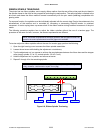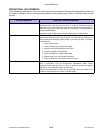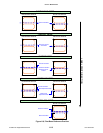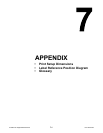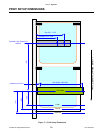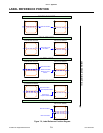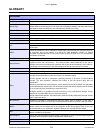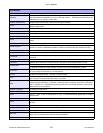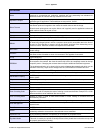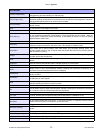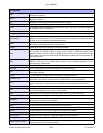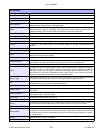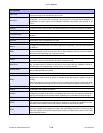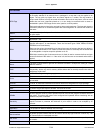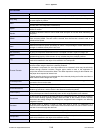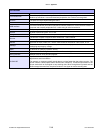
Unit 7: Appendix
CL408-412e Supplemental Manual
7-11 PN: 9001159A
RFID Tags
A system of finding the position or location of assets.
A microchip attached to an antenna that is packaged in a way that it can be applied to an
object. The tag picks up signals from, and sends signals to, a reader. The tag contains a
unique serial number, but may have other information and come in many forms, such as smart
labels that can have a barcode printed on it, or can simply be mounted inside a carton or
embedded in plastic. RFID tags can be active, passive, or semi-passive.
Each tag broadcasts a signal to be received by three reader antennas. The time each signal is
received is passed on to a software system that uses triangulation to calculate the location of
the asset.
Ribbon
A thin, flexible strip with layers of material; one of which contains ink used to produce an image
on print media.
Ribbon Core A thick cardboard sleeve onto which ribbon is wound.
Rigid Not flexible - stiff.
ROM
(Read-Only Memory) Also known as firmware, is an integrated circuit programmed with
specific data when it is manufactured. There are five basic types: ROM, PROM, EPROM,
EEPROM, and Flash Memory.
Each type has unique characteristics, but they all are types of memory that have two things in
common: the stored data is non-volatile (not lost when power is removed) and the stored data
is unchangeable or requires a special operation to do so.
ROM chips contain a grid of columns and rows. A diode is used to connect the lines and gain
access to the data if the value is 1. If the value is 0, the lines are not connected and access is
denied.
RPM (Revolutions Per Minute) The number of cycles within the time span of one minute.
Route
The path or course taken to get from one location to another - example: the routing of a cable
within a machine.
SAM
(Serial Access Memory) Stores data as a series of memory cell that can only be accessed
sequentially. Works very well for memory buffers where data is normally stored in the order in
which they will be used.
SBPL (SATO Basic Programming Language)
Scale
The units to measure distance - or a short tool for measurement.
To increase or decrease the proportionate size of an object - example: text or graphics on a
printed label.
Scanner In RFID, an antennas transmitter and receiver electronics integrated in a single package.
Screen An electronic display.
Seat To nest or couple one object to another. The same as to nest.
Secondary The next to follow the primary in sequence or importance.
SEMBL
A SATO specific mode of printer operation that can execute the program of BASIC format in
the printer. This allows the printer to be configured and operated without interfacing with an
external computer or software.
Sensitivity
The degree of ease or difficult to gain a response - example: a sensor transmitter signal may
require increase to penetrate the thickness of print media in order to be receipted by its
receiver.
Sensor A device that responds to a physical stimulus and produces and electronic signal.
Separation The operational distance between two RFID tags.
Sequential One to follow another in a specified order - examples: 1, 2, 3; A, B, C.
Serial Interface
A general-purpose interface that can be used for almost any type of device in which only 1 bit
of communication is transmitted at a time.
Set Screw
Attachment hardware specifically used to secure an object may be moved in a specific position
or location.
Shaft Any rod, bar, or tube.
GLOSSARY



